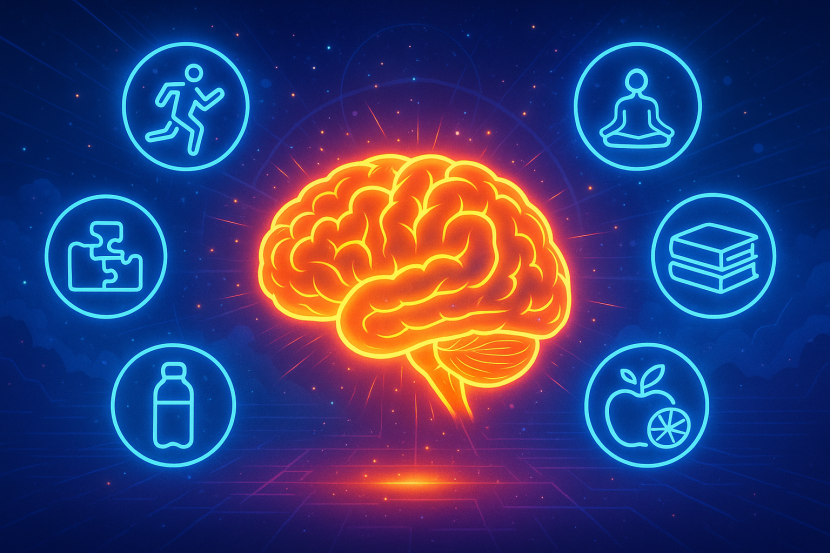Have you ever read a page only to forget what it said seconds later? Or found yourself mentally exhausted halfway through the day? In today’s hyper-connected world, where distractions are constant and information overload is the norm, staying mentally sharp isn’t just a luxury — it’s a necessity.
Whether you’re a student cramming for exams, a busy professional juggling tasks, or someone simply hoping to age gracefully with a sharp mind, the truth is this: your brain is a living, evolving organ that thrives on how you treat it. The myth that intelligence and memory are fixed is long gone. With the right habits, you can boost your brain power, sharpen focus, and supercharge memory — at any age.
In this blog, we explore 10 practical, research-backed ways to improve cognitive performance naturally. From movement and mindfulness to nutrition and sleep, these simple yet powerful techniques are designed to awaken your brain’s full potential.
1. Exercise Your Body to Exercise Your Brain

Why it works: Physical activity improves blood flow to the brain, increases the production of brain-derived neurotrophic factor (BDNF), and stimulates the growth of new brain cells.
What to do:
- Engage in aerobic exercises like brisk walking, cycling, or swimming for 30 minutes daily.
- Include coordination-based activities like dancing or martial arts, which challenge both body and mind.
Research says: According to a Harvard Health report, regular exercise helps protect against age-related cognitive decline and can improve mood and sleep.
2. Train Your Brain with Mental Challenges

Why it works: Solving problems, learning new things, and facing mental challenges improve neuroplasticity and increase mental flexibility.
What to try:
- Daily Sudoku, crossword puzzles, or brain-training apps like Lumosity.
- Learn a new language, musical instrument, or even coding.
Example: A 2022 study from Frontiers in Psychology found that bilingual adults had a slower cognitive decline compared to monolinguals due to consistent mental activity.
3. Eat a Brain-Boosting Diet

Why it works: The brain consumes about 20% of the body’s energy, and a nutrient-rich diet helps maintain mental performance and prevent cognitive disorders.
Include in your diet:
- Omega-3 rich foods: Fatty fish, flaxseeds, walnuts
- Antioxidants: Blueberries, dark chocolate, green tea
- Whole grains, leafy greens, turmeric, and eggs
Research says: The MIND Diet, a combination of the Mediterranean and DASH diets, is linked to a reduced risk of Alzheimer’s disease.
4. Prioritize Quality Sleep

Why it works: During sleep, the brain consolidates memories, processes emotions, and clears out toxins like beta-amyloid.
Tips for better sleep:
- Stick to a sleep schedule (7–9 hours).
- Avoid screens and caffeine before bed.
- Use white noise or sleep apps if needed.
Backed by science: Sleep deprivation can lead to attention lapses, reduced short-term memory, and slower response times.
5. Practice Mindfulness and Meditation

Why it works: Meditation enhances the brain’s gray matter in areas related to learning, memory, and emotional regulation.
Simple daily habit:
- Try 10 minutes of deep breathing or guided meditation using apps like Headspace or Insight Timer.
Real-world impact: Long-term meditators have shown improved attention, working memory, and emotional control in clinical studies.
6. Stay Socially Engaged

Why it works: Human interaction stimulates brain regions responsible for emotional and cognitive processing. Social isolation has been linked to faster cognitive decline.
Ideas to stay connected:
- Regular calls or meetups with friends and family
- Join clubs, take group classes, or volunteer
Example: A 2023 study in The Lancet found that strong social connections can reduce dementia risk by up to 30%.
7. Stay Organized with Mental Aids

Why it works: Reducing mental clutter helps the brain focus on what’s important and improves recall.
Tips to organize your mind:
- Use planners, alarms, sticky notes, and digital reminders.
- Break tasks into smaller steps and focus on one at a time (no multitasking!).
Why it helps: Streamlining your environment allows the brain to work more efficiently without overloading your working memory.
8. Manage Stress to Protect Memory

Why it works: Chronic stress raises cortisol levels, which damage the hippocampus—the brain’s memory center.
Stress-busting techniques:
- Deep breathing, journaling, art therapy
- Practicing gratitude and setting healthy boundaries
Medical insight: Prolonged stress has been shown to shrink brain volume in areas linked to memory and learning.
9. Limit Alcohol and Say No to Smoking

Why it works: Both alcohol and tobacco introduce neurotoxins that interfere with brain communication and memory formation.
Tips for improvement:
- Moderate alcohol intake (1 drink/day for women, 2 for men)
- Seek professional help for quitting smoking—your brain will thank you.
Research shows: Chronic alcohol use can lead to brain shrinkage and memory blackouts.
10. Drink Plenty of Water

Why it works: The brain is about 75% water. Even mild dehydration can impair focus, memory, and alertness.
Daily goal:
- Aim for 8–10 glasses a day.
- Increase intake during exercise or hot weather.
Quick tip: If you’re feeling mentally sluggish, try drinking a glass of water first.
Final Thoughts
Boosting your brain power doesn’t require a miracle pill—it’s about consistently nurturing your mind through everyday habits. Exercise, nutrition, social connection, and mental stimulation are all powerful, proven tools to enhance your memory and keep your brain sharp.
By incorporating these 10 practices into your daily routine, you’ll not only protect your brain health today but also build a better, brighter mental future.




